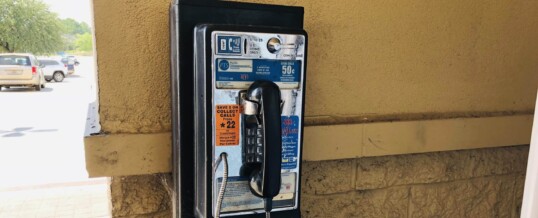
It appears that telephone landlines may be on their way out.
CNN Business reported that recently, AT&T applied for a waiver in the state of California to stop servicing traditional landlines. Both AT&T and Verizon have both said they want to move away from landlines, but this latest move makes it real.
Until I was in third grade, my household didn’t even have a phone. When we got one, it hung on the kitchen wall and was only for adults, emergencies, or birthday calls from your grandparents.
The telephone was utilitarian, like the stove or the gas furnaces that were scattered in the floor throughout our home on Beech Street in Ashdown, Arkansas.
Unlike today, where children leave the hospital with a complimentary bag of diapers, a pacifier, rattle, and the latest iPhone (that last one was a joke, but not by much), kids did not use the phone unless they had permission.
Today, children who can barely read are sitting in restaurants with a digital device that costs three times as much as my first car.
Alexander Graham Bell got the patent on the first practical telephone, and founded AT&T. But he considered the phone to be intrusive and wouldn’t even have one in his work area.
He invented the thing, but immediately saw its place.
When Bell died in 1922, he likely never could have imagined how ubiquitous the telephone is today. I counted the phones in our home and there are four.
There are only three people living here.
But there’s something that bothers me about the idea of cutting the cord. No more landlines. I just seems to be a bad idea. Sad, if nothing else.
A few years ago my mom casually mentioned during a conversation that she had disconnected her landline. The only phone number my parents had ever had in the house was gone.
I shouldn’t have been surprised. I’d disconnected the landline my wife and I had, even before that.
But it wasn’t the same thing. The landline my mom and dad had carried with them from every house since Beech Street was gone. The number I called to reach them for something important I had to share; the number I called to tell them their grandson had scored in his little league game; the number I’d called for so many reasons — was gone.
I know that you can carry your number with you from your landline to a cellphone, but it’s not the same thing. That number, and the phone line to which it’s been connected, have meant something to us.
For millions of Americans, it was a tangible. And now it won’t be.
None of this should be a surprise. The choices we’ve made as consumers drive the changes that come along. Using cellphones has pushed the demise of the telephone landline just as our use of the Internet nudged along the demise of telephone books and operators.
One of quickest ways to find the number of a business you needed used to be the Yellow Pages. Telephone directories now have a place, but it’s not the home. It’s the Smithsonian.
And when was the last time you called a phone operator or could call one? A friend of mine used to work as a telephone operator (boy, does she have some stories), but she hasn’t done that for a living in many years.
Every consumer who bought a cellphone has pushed the end of the landline, just as surely as buying at Wal Mart instead of the locally owned mom and pop stores sent the mom and pop stores into extinction.
Now, Wal Mart is struggling with their brick and mortar stores because people aren’t even going to the store. They’re buying online and having someone bring what they bought to their front door.
I always liked the security of the landline. Our enemies could take out the phone system, but they’d have to do it piece-by-piece, town-by-town, and neighborhood-by-neighborhood.
Cellphones are only as reliable as the towers that connect them. Instead of a landline for each phone, we now have one tower for lots of cellphones.
What could go wrong?
Maybe we should all go to Wal Mart and buy a new cellphone before Wal Mart’s gone. Or before our cellphones don’t work and we can’t get on our cellphone to order a new cellphone.
©2024 John Moore
John’s books, Puns for Groan People and Write of Passage: A Southerner’s View of Then and Now Vol. 1 and Vol. 2, are available on his website TheCountryWriter.com, where you can also send him a message.
FEB
2024
